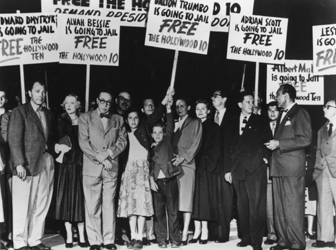Eleanor Roosevelt stamp courtesy
Just as her husband, President Franklin D. Roosevelt, calmed the nation with his fireside chats in the midst of the Second World War, Eleanor Roosevelt calmed the nation with her wise advice laid out in her column "My Day". Six days a week, from 1935 to 1962, Eleanor Roosevelt typed the column on her typewriter, reaching millions of readers across America. At the height of its popularity, "My Day" appeared in over 90 papers nation wide.

My Day: The Best of Eleanor Roosevelt's Acclaimed Newspaper Columns, 1936 to 1962 courtesy https://www.amazon.com/Day-Roosevelts-Acclaimed-Newspaper-1936-1962/dp/0306810107.
In June of 1943, the First Lady tackled controversial issues like Civil Rights, commenting: By the 1940's, Detroit already had a history of racial conflict. Race riots had occurred in 1863 and as recently as 1941. By the 1920's the city had become a stronghold of the Ku Klux Klan...The industrial plants provided jobs but no housing. White communities militantly guarded the dividing lines imposed by segregation throughout Detroit's history. As a result, the city's 200,000 black residents were cramped into 60 square blocks on the East Side and forced to live under deplorable sanitary conditions. Ironically, the ghetto was called Paradise Valley."

Detroit Race Riots on Woodward in 1943 courtesy https://www.mtholyoke.edu/courses/rschwart/clio/detroit_riot/DetroitNewsRiots1943.htm.
On July 14, 1939, Eleanor Roosevelt expressed her views on Prohibition, stating: "I was one of those who was very happy when the original prohibition amendment passed...But I came gradually to see that laws are only observed with the consent of the individuals..."

Detroit Police inspect a brewery during Prohibition courtesy https://en.wikipedia.org/wiki/Prohibition_in_the_United_States.
On December 8, 1941, the First Lady, reeling from the attack on Pearl Harbor, commented: "The clouds of uncertainty and anxiety have been hanging over us for a long time. The work for those who are at home seems to me to be obvious. First, to do our own job, whatever it is, as well as we can possibly do it. Second, to add to it, everything we can do in the way of civilian defense. Now, at last. every community must go to work to build up protection from attack."
President Roosevelt's "A Date That Will Live Infamy" Speech courtesy http://likesuccess.com/52034.
On October 29, 1947, regarding HUAC (The House on Un-American Activites Committee) investigating Hollywood, Eleanor Roosevelt said: "One thing is for sure -- none of the arts flourishes under censorship and repression. And by this time it should be evident that the American public is capable of doing its own censoring. Certainly, the Thomas Committee is growing more ludicrous daily. The picture of six officers ejecting a writer from the witness stand because he refused to say whether he is a Communist or not is pretty funny and I think before long we are all going to see how hysterical and foolish we have become."

Protesters march against impending incarceration of the Hollywood Ten circa 1950 courtesy https://en.wikipedia.org/wiki/Hollywood_blacklist.
During the Second World War, the First Lady, a champion of childhood literacy, "urged parents to read aloud to their children as a way of bolstering family morale and maintaining an atmosphere of normality on the home front." The advent of Little Golden books helped this come to fruition (see How a Poky Puppy Brought the Picture Book to the Masses at http://alinefromlinda.blogspot.ca/2013/07/how-poky-puppy-brought-picture-book-to.html).

Golden Legacy courtesy
No comments:
Post a Comment